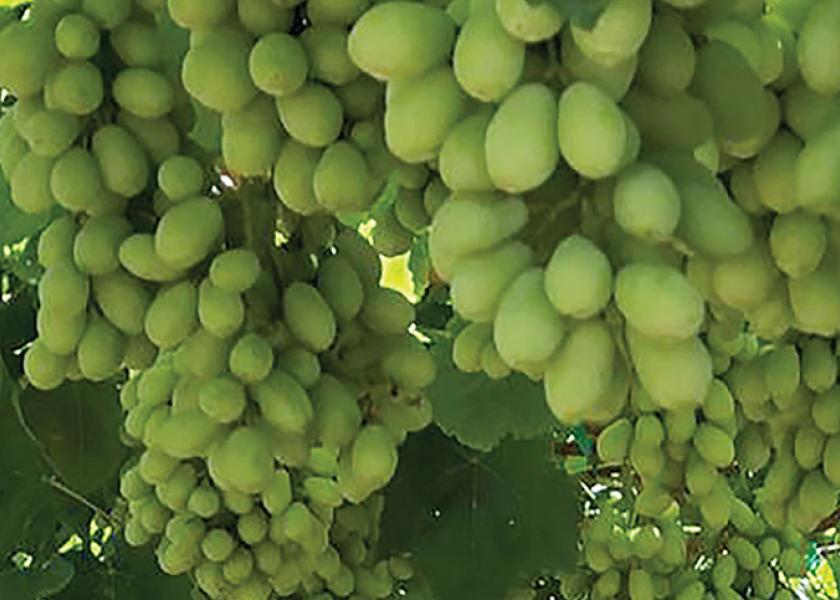New grape varieties continue to alter grape landscape

New grape varieties are quickly supplanting older, established cousins across Mexico, growers say.
“We have been growing very fast as an industry with new license (proprietary) varieties,” said Juan Laborin, director of the Hermosillo, Mexico-based Sonora Table Grape Growers Association.
“Today, almost 30% of the 2020 crop will be new varieties, licensed, that includes early mid- and unique new varieties.”
Early Sweet and Prime Seedless grapes are taking the place of perlettes, and mid-white-season new varieties are pushing out established sugraones, Laborin said.
“On the red seedless side, flame seedless is still the queen, but we have new varieties, like Arra 29 and Sweet Celebration, that are slowly growing in Mexican production,” he said.
Newcomers, indeed, are making gains, but they remain a relatively small percentage of total production in Mexico, said Miguel Suarez, owner of Rio Rico, Ariz.-based MAS Melons & Grapes.
“It’s still very small part of the mix,” he said.
Related content: Mexican grape deal collides with COVID-19 pandemic
Suarez noted that, of a total of 23.4 million boxes of Mexican grapes that entered the U.S. market in 2019, there were 1.7 million cartons of perlettes; 1.6 million flames; 4 million sugraone; and 652,000 boxes of Sweet Celebration.
“I think that’s not too many, so it’s still not a big chunk, especially on red grapes,” he said.
Most gains among newcomers are in the green-grape category, Suarez said, noting that timing is an issue.
“There’s not a lot of red grapes on newer varieties yet, on volume,” he said. “In my point of view, some of the green varieties fit into the season, time-wise. There’s some other red varieties, like Sweet Celebration, that come later than flames. So, it’s not just having a new variety, but it’s having them in the time we need it. That’s why the flames are the biggest number; there’s no variety to replace the flame, time-wise.”
In time, though, newer varieties will gain larger shares, Suarez said.
“They’re still gaining and they’re going to continue,” he said.
Nogales, Ariz.-based Fresh Farms is offering new varieties for the upcoming season, said George Matoian, who works in sales and marketing.
“We will harvest the following premium varieties this season from Jalisco: Ivory, Sweet Globe, Sugar Crisp, Great Green, Sweet Celebration and, of course, the consumer favorite, Cotton Candy.” More new varieties will come out of Mexico, Matoian said.
“We will see an increase of all proprietary varieties with progressive growers, and a definite reduction of acreage as older vineyards and less desired varieties are being removed from production,” he said.
The Vancouver, British Columbia-based Oppenheimer Group focuses each year on bringing new proprietary grape varieties out of Mexico, said Marc Serpa, director of domestic grapes and sales manager.
Related content: Mexican growers forecast ample crop, despite rough weather
“We understand that the needs of the consumer and thus the retail customer change in unison, and by introducing excellent proprietary varieties over the years we have been able to stay at the forefront of industry trends.”
The 2020 Mexican grape season at Oppy will see an increase in offerings of organic product as well as new varieties to complement the company’s traditional varieties, Serpa said.
Palm Desert, Calif.-based Sun World Innovations will have new offerings, particularly early in the season, said Dane Joubert, marketing manager.
“In regards to new varieties, Sun World will have a few new early season selections with trial volumes available,” he said.
He also noted traditional red varieties remain dominant in the spring grape season, “although green is gaining more interest and, of course, black seedless continue their march forward as an important segment of the Mexico grape offering.”
Proprietary varieties took a “big step forward” last year, representing 15% of the total crop, said Carlos Bon, sales manager with Nogales-based Divine Flavor LLC.
“This year, it might be more like 20%,” he said. “(It is) definitely increasing and changing the landscape, as most new varieties are later varieties.”
Perlettes are disappearing “little by little,” and sugraones also are “decreasing in acreage,” but flames continue to maintain a stronghold in the marketplace, Bon said.
“I do not see flames decreasing in acreage like in other countries, as we fill a needed gap with those,” he said.







